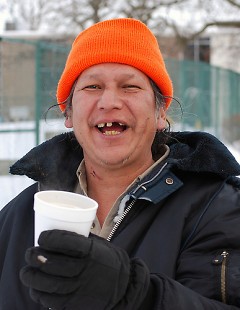In Grand Rapids, more than 5,000 people are considered homeless, half of whom are part of homeless families. Homelessness is a problem that stems from multiple causes including job loss, jail time, being released from foster care with nowhere to go, and the inability to keep up with the rising costs of living as Grand Rapids grows and develops. Janay Brower, the coordinator of the Grand Rapids Area Coalition to End Homelessness, indicated that the main cause of homelessness is that housing is simply unaffordable to many – unaffordable being defined as 30% or more of an annual household’s income being devoted to housing costs.
“As much as 49% of the housing crisis is due to housing issues, including eviction, unemployment, pay cuts which cause the inability to pay rent, and overcrowding in current housing,” Brower said.
Factors like these have led many Grand Rapids area residents to become a part of the homeless community.
Over 200 organizations work with the Coalition to address the varied causes of homelessness and to provide for the homeless community. The Coalition is actively pursuing solutions and has recently published a study linking transportation costs and homelessness, which highlights the idea that many residents of Grand Rapids are forced to make unrealistic choices when the costs of their basic needs outstrip their income. Additionally, the Grand Rapids Area Housing Continuum of Care (HCOC) has developed a plan called "The Vision to End Homelessness,” which is designed to bring an end to this problem in Grand Rapids within the coming generation. The plan emphasizes the importance of providing affordable housing situations with ongoing assistance to avoid relapse into homelessness.
Dwelling Place, a nonprofit organization based in Grand Rapids, provides fundamental services to help the homeless get back on their feet. Providing assistance and networking for the homeless is perhaps one of the greatest factors that lead individuals from rock bottom to recovery.
Lynn Sorrell, the property manager of Verne Barry Place (a Dwelling Place community), went in to great detail about the logistics of providing aid to the homeless community. The necessity to plan from day-to-day, meal-to-meal for the homeless community is not easy nor inexpensive by any means.The reach of Dwelling Place covers many different organizations, such as Goodwill, the Salvation Army, United Way, and other grassroots organizations like the Verne Barry Place. All of these area groups work together to help decrease homelessness and bring those who are homeless back into the community.
Decreasing homelessness is advantageous not only for those who need housing for the city of Grand Rapids at large. It is more expensive to house people at a shelter for prolonged periods of time than it is to re-house them. According to the HCOC, the total average cost of providing permanent supportive housing is $7,236 less a year than if that individual was in an emergency shelter. Along with shelters, homeless individuals may seek temporary shelter in hospitals, further inflating costs as a day in a state hospital costs on average $398.26 per person. Once housed, individuals have the resources to apply for jobs and to practice presence for interviews; in the long run they are able to pay their housing after getting a job.
Homelessness is not something that directly affects everyone in Grand Rapids, but its effects can be felt by everyone. Taxes pay for the current resources required to support the homeless. Also, the conditions that homeless people are subject to do not reflect acceptable living standards, nor the image that the city of Grand Rapids has been working to uphold. As the city of Grand Rapids continues to develop, it is important that we consider the prosperity of all its inhabitants. Despite this, there is a lack of awareness of the facts surrounding homelessness. Changing the current system to focus on affordable, permanent housing should be a continuing part of political and social discussion. To quote Roofs To Roots, ending homelessness is a “simple idea with a big potential: with a roof overhead, people have the roots needed to feel welcome and grow strong.”
Tackling homelessness in our community is no easy task, but it is definitely worthwhile to develop active, outgoing, and prosperous citizens as our city continues to expand. It is a problem which cannot be ignored. As citizens of Grand Rapids we are all responsible for maintaining the quality of our city, and eliminating homelessness is a task that we all can and should take part in. If you would like to lend a hand in the fight against homelessness, contact information for many Grand Rapids organizations are listed on the Coalition's website.
The Rapidian, a program of the 501(c)3 nonprofit Community Media Center, relies on the community’s support to help cover the cost of training reporters and publishing content.
We need your help.
If each of our readers and content creators who values this community platform help support its creation and maintenance, The Rapidian can continue to educate and facilitate a conversation around issues for years to come.
Please support The Rapidian and make a contribution today.



Comments
in the sidebar is the question about the reader's experience with homeless in the city... i live near heartside, come into contact with patrons regularly at Clark's, and on Division attending different events, running errands etc on a frequent basis... i have given people money in the past, but believe it to be a bad idea... especially after some of the interactions i have had... the same guys giving me the same exact story on multiple occasions.... one guy came close to violence when i called him out on his scam while other legitimate people suffer for this type of behavior... and i too have taken advantage of services in town due to my fallout from the economic collapse, so i appreciate the work being done in town... it's frustrating to see both sides of the argument and no real solid solutions in place